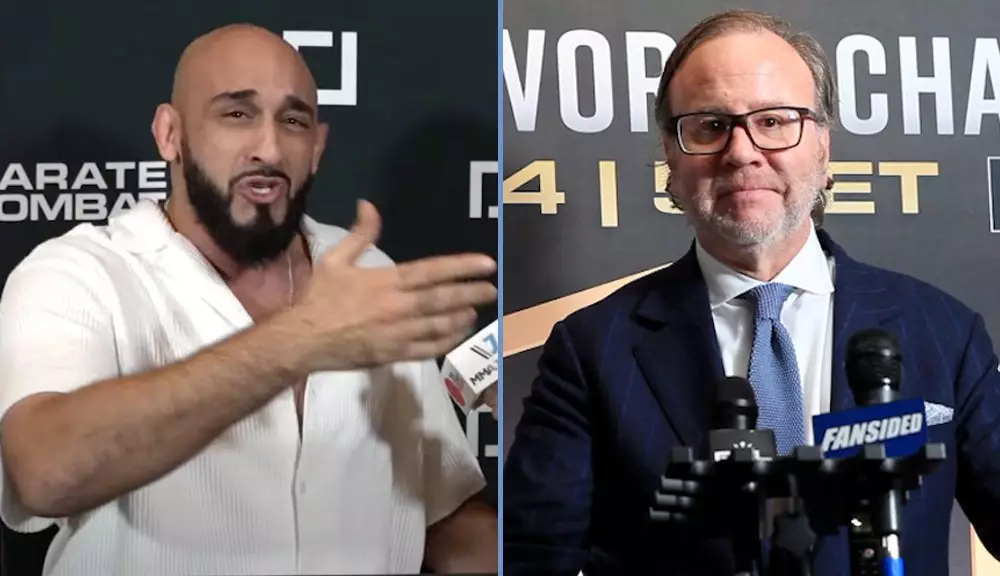In the highly competitive world of combat sports, the essence of effective leadership often comes under scrutiny. With fans and fighters alike constantly evaluating promotions and their executives, the expectations placed on these leaders can be daunting. Asim Zaidi, the president of Karate Combat, is one such figure who is not only aware of these challenges but is also unafraid to hold himself and others accountable. Recently, his remarks directed at PFL co-founder Donn Davis have ignited discussions about the compatibility of financial acumen with the nuanced understanding of martial arts.
Leadership in the realm of combat sports requires much more than business acumen; it demands an in-depth understanding of the sport itself. Zaidi’s criticisms point toward a fundamental disconnect that can arise when individuals who are primarily financial professionals attempt to navigate the complex world of mixed martial arts. This issue is particularly evident when leaders lack firsthand experience in martial arts, which can result in decision-making that may not resonate with the fighters or the fans. zaidi’s contention that expertise in combat sports should be a prerequisite for leadership raises critical questions about how promotions operate and who is best suited to steer them.
Zaidi’s candid remarks suggest that he believes Davis’s lack of martial arts training hinders his ability to empathize with fighters. He argued that understanding the emotional and physical struggles of fighters is paramount to making informed decisions on their behalf. Fighters like Patricio ‘Pitbull’ Freire, who face challenges in their careers, require leadership that is not just financially savvy but is also emotionally intelligent and aware of the unique pressures athletes face. In Zaidi’s view, it is essential for leaders to fully grasp the sport’s intricacies to effectively advocate for fighters’ needs and create an environment in which they can thrive.
Despite the criticisms directed at him, Davis has exhibited a willingness to adapt and listen to feedback from fighters and fans alike. His acknowledgment of grievances, such as Freire’s public plea for release, demonstrates an awareness of the sentiment within the community. Adjustments made under his leadership, including modifications to the promotion’s seasonal format, suggest a responsiveness that is necessary for any leader in a dynamic sport like MMA.
However, Zaidi’s observations call into question whether Davis’s efforts to connect with the sport are sufficient. The underlying issue remains whether leadership should include individuals deeply entrenched in martial arts culture or if business expertise can suffice. Davis’s financial proficiency could serve as an asset, yet Zaidi’s proposition of placing a respected former fighter, like Ray Sefo, in a more prominent leadership role speaks to a desire for authenticity and relatability in the sport’s representation.
Drawing on the idea that combat sports require an intimate understanding of its culture, Zaidi champions the notion that leaders in this realm should ideally have a background in martial arts. A figure like Ray Sefo, who not only understands the athletes’ perspectives but has also lived through the trials of competition, embodies the type of leadership that could unite the fighters, fans, and business objectives of a promotion.
This appeal for authentic leadership transcends mere performance metrics; it underscores the emotional and psychological aspects of sports management. A leader who has engaged with the sport at a grassroots level brings insights that are often overlooked in boardrooms dominated by numbers and strategies. The desire for leaders who are relatable and credible ties back to the fundamental values that fans and fighters hold dear, molding the reputation of a promotion not only as a business entity but as a community.
As Asim Zaidi openly critiques his peers while holding himself accountable, he advances a narrative that places an emphasis on reflective leadership in combat sports. His analysis of Donn Davis’s role in the PFL highlights the broader discourse surrounding the importance of experiential knowledge in a sport defined by its raw intensity and complexity. The call for leaders who genuinely understand the lives and struggles of fighters, combined with financial acumen, could very well shape the future of combat sports promotions. Ultimately, the conversations sparked by such critiques are crucial in ensuring that the heart of the sport remains aligned with its leadership.

